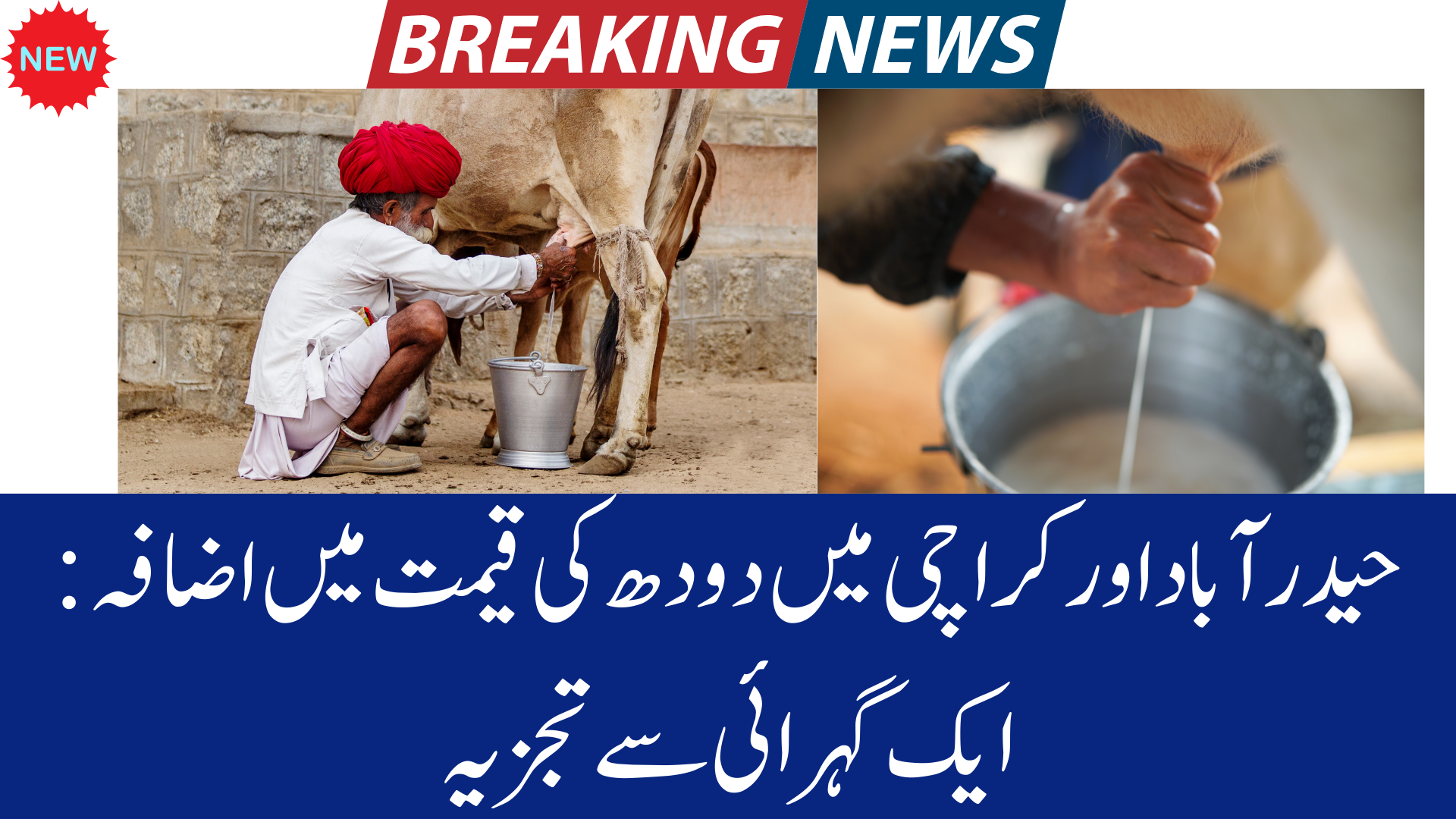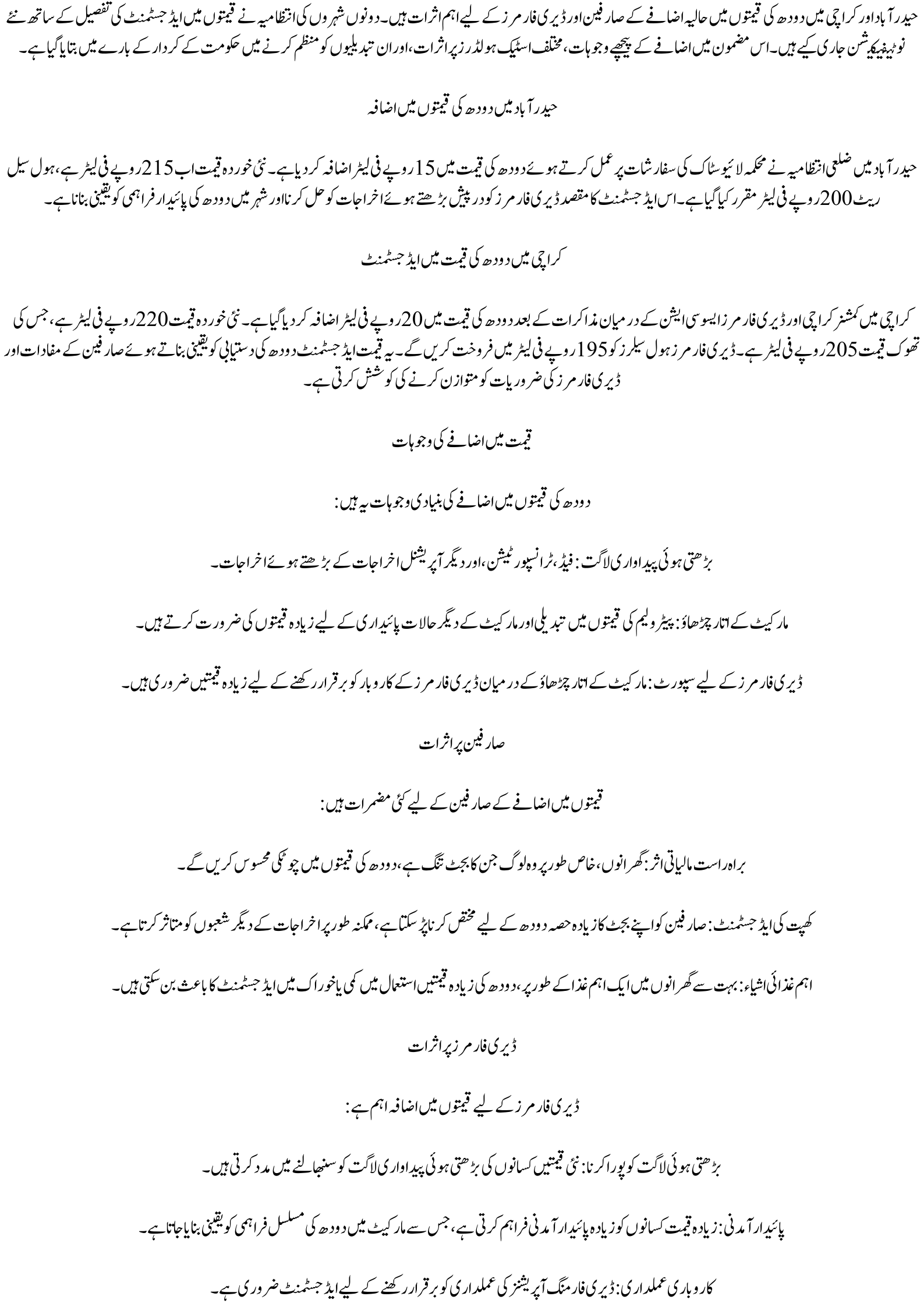Milk Price Increase in Hyderabad and Karachi: An In-Depth Analysis
The recent surge in milk prices in Hyderabad and Karachi has significant implications for consumers and dairy farmers. Both cities’ administrations have issued new notifications detailing the price adjustments. This article delves into the reasons behind the hikes, the impact on different stakeholders, and the government’s role in regulating these changes.
Milk Price
Milk prices have surged in Hyderabad and Karachi. Hyderabad’s district administration increased the retail price to Rs215 per liter, a Rs15 hike, following recommendations from the Livestock Department. Similarly, Karachi’s milk price rose by Rs20 per liter. This follows a series of price increases over the past year, driven by factors like rising input costs and increased taxes on packaged milk. The new prices have sparked concerns among consumers already grappling with high inflation.
Price Increase in Hyderabad
Milk prices have surged in Hyderabad and Karachi. Following recommendations from the Livestock Department, Hyderabad’s district administration increased milk prices by Rs15 per liter, bringing the retail price to Rs215. Karachi’s milk price was also hiked by Rs20 per liter to Rs220. These increases, attributed to rising input costs for dairy farmers, have added to inflationary pressures on consumers already grappling with economic challenges.
Hyderabad’s Milk Price Hike
In Hyderabad, the district administration, following recommendations from the Livestock Department, has raised the price of milk by Rs 15 per liter. The new retail price is now Rs 215 per liter, with the wholesale rate set at Rs 200 per liter. This adjustment aims to address the rising costs faced by dairy farmers and ensure a sustainable milk supply in the city.
Karachi’s Milk Price Adjustment
In Karachi, after negotiations between the Commissioner of Karachi and the Dairy Farmers Association, the price of milk has been increased by Rs 20 per liter. The new retail price is Rs 220 per liter, with the wholesale price at Rs 205 per liter. Dairy farmers will sell to wholesalers at Rs 195 per liter. This price adjustment seeks to balance consumer interests and dairy farmers’ needs while ensuring milk availability.
Reasons for the Price Increase
The primary reasons for the milk price increase include:
Rising Production Costs: Increased costs of feed, transportation, and other operational expenses.
Market Fluctuations: Changes in petroleum prices and other market conditions necessitate higher prices for sustainability.
Support for Dairy Farmers: Higher prices are essential to sustain dairy farmers’ businesses amidst fluctuating market conditions.
Impact on Consumers
The price increase has several implications for consumers:
Direct Financial Impact: Households, especially those with tight budgets, will feel the pinch of higher milk prices.
Consumption Adjustments: Consumers may need to allocate more of their budget to milk, potentially affecting other areas of spending.
Staple Food Item: As a staple in many households, higher milk prices might lead to reduced consumption or adjustments in diet.
Impact on Dairy Farmers
For dairy farmers, the price increase is crucial:
Covering Rising Costs: The new prices help farmers manage increased production costs.
Sustainable Income: Higher prices provide farmers with a more sustainable income, ensuring the continued supply of milk to the market.
Business Viability: The adjustment is essential for maintaining the viability of dairy farming operations.
READ MORE: Punjab Green Tractor Scheme 2024: Enhancing Agricultural Productivity
Milk Price Increase in Hyderabad and Karachi: An In-Depth Analysis
Government and Regulatory Measures
The government and regulatory bodies have taken several steps to manage the new milk prices:
Price Regulation: Agreements with dairy farmers in Karachi ensure compliance with official prices.
Transparency: Sellers must display purchase and sale rates clearly to prevent unauthorized price increases.
Monitoring: Regulatory measures are in place to ensure fair practices in the market and adherence to set prices until December 31.
ALSO READ: Kisan Card Scheme 2024: Punjab Government’s Initiative to Support Farmers
Conclusion
The recent milk price hikes in Hyderabad and Karachi highlight the complex dynamics between production costs, market demands, and consumer needs. While the increases are challenging for consumers, they are necessary to support dairy farmers and maintain a stable milk supply. Government interventions and regulatory measures play a crucial role in balancing these interests and ensuring fair practices in the market.
For more updates on economic measures and market regulations, stay informed through reliable news sources and official notifications.


